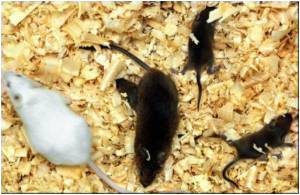A couch potato mouse model has been used by scientists at Sanford-Burnham Medical Research Institute to study muscle function.

They report what happens when muscle tissue lacks PGC-1, a protein coactivator that muscles need to convert fuel into energy.
In obese individuals, PGC-1 levels drop, possibly further reducing a person's capacity to exercise - creating a vicious cycle. In this study, mice without muscle PGC-1 looked normal and walked around without difficulty, but could not run on a treadmill.
What happens is that the part of the cell that converts fuel into energy - can't function properly, so cells have to work harder to stay vigorous. This extra effort rapidly depletes carbohydrate fuel stores, leading to premature fatigue.
However, PGC-1-deficient couch potato mice were not obese and still respond normally to insulin - meaning they are not at risk for developing diabetes despite their sedentary lifestyles and mitochondrial problems.
This study dispels that notion, instead suggesting that perhaps malfunctioning mitochondria are a result of diabetes, rather than a cause.
Advertisement
"We are now investigating what happens when we boost PGC-1 activity intermittently, as normally occurs when a person exercises."
Advertisement
Source-ANI








